A Light in the Darkness of the Slums of India
By Shuyin
Buddhistdoor Global
| 2017-04-13 | 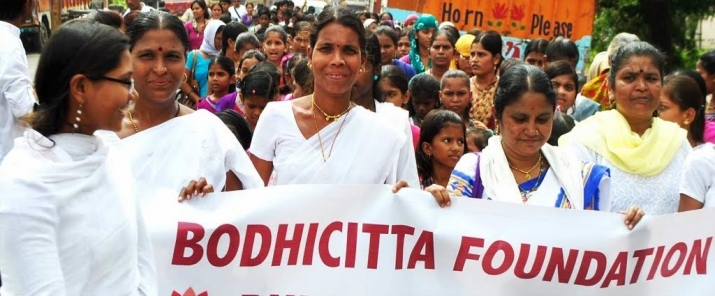 Poor Dalit women find a voice through the Bodhicitta Foundation. Image courtesy of the Bodhicitta Foundation and Marc Leow
Poor Dalit women find a voice through the Bodhicitta Foundation. Image courtesy of the Bodhicitta Foundation and Marc LeowRight in the centre of India sits the city of Nagpur. Here, where summer temperatures soar as high as 47°C and the streets are always dusty and grimy, lives the largest population of Dalits* who converted to Buddhism in the footsteps of Dr. B.R. Ambedkar. It was also here, amid the sweltering heat, the unpaved roads, and the mud huts of the slum, that Australian nun Ayya Yeshe found love, compassion, and the meaning of life.
As a child, Ayya had all the toys she wanted but felt a deep yearning for something more. When she was 14, her father died of cancer. His death left her with a profound sense of desolation and she began to question what life was all about. At 15, she left home and experimented with drugs, relationships, and different lifestyles. Although she experienced momentary happiness, there always was an emptiness. At 17, she traveled to Nepal and India, where she discovered Buddhism and meditation. Somehow all the questions she had were answered and, for the first time, Ayya felt freedom, peace, stability, and a joy that had eluded her all her life.
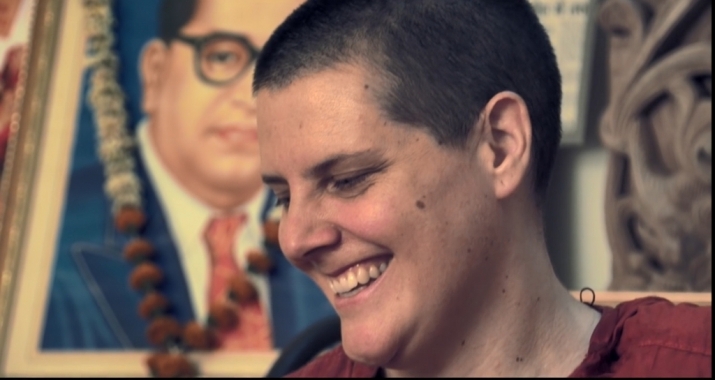 Ayya Yeshe in front of a picture of Dr. Babasheb Ambedkar, who is an inspiration for all Dalits in Nagpur. Image courtesy of the Bodhicitta Foundation and Marc Leow
Ayya Yeshe in front of a picture of Dr. Babasheb Ambedkar, who is an inspiration for all Dalits in Nagpur. Image courtesy of the Bodhicitta Foundation and Marc LeowUpon returning to Australia, Ayya trained with her teacher Khenpo Ngawang Dhamchoe for five years. In 2001, she was ordained, but soon realised that life as a non-Himalayan Buddhist nun was not quite what she had expected. She noticed there was little support for non-Himalayan nuns and that the Buddhist tradition, of which she was part, was highly hierarchical and patriarchal.
By 2004, Ayya had returned to India, the land with which she felt connected. She was eager to share the Dharma with the Dalits of Nagpur, but once again reality set in. She quickly learned that when one’s stomach is crying for food and children are dying of sickness, there is simply no place for the Dharma. While conversion to Buddhism is hailed as a way out of the oppressive caste system, many converted Dalits continue to live in abject poverty and suffer caste-based exclusion from economic, civil, cultural, and political rights. Ayya realized that the practice of the Dharma required her to step out of the temple, to walk among the poor, listen to the cries of the children, and to respond to the suffering in the world around her. In 2007, she founded the Bodhicitta Foundation to improve the lives of those living in the slums, especially poor and vulnerable women and children. The foundation aims to empower these women and children with education, job skills, human rights, health, and wellbeing.
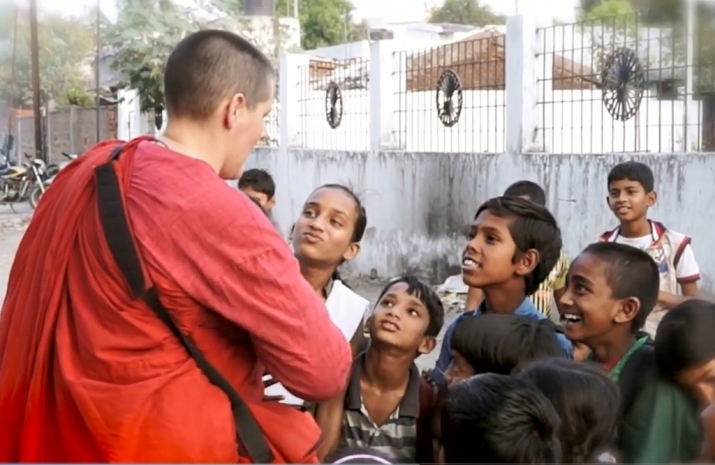 For Ayya Yeshe, the slums of Nagpur are where her heart is. Image courtesy of the Bodhicitta Foundation and Marc Leow
For Ayya Yeshe, the slums of Nagpur are where her heart is. Image courtesy of the Bodhicitta Foundation and Marc LeowThe foundation runs an ashram, which provides 30 girls (from different backgrounds and states in India) with the opportunity to pursue education in a safe, caring, and supportive environment. Other than providing free food and accommodation, the foundation helps to support the educational needs of the girls. Seven of the girls are studying for their university degrees. Among them is 18-year-old Gita from Uttar Pradesh, who has just completed her first year of university. Gita dreams of being a world-class athlete, and hopes to, one day, represent India in the Olympics for the High jump. She has been working hard to obtain this goal, winning medals at the national level. Sadly, her parents can not share her accomplishments, nor can they share her dreams, since her father has passed away and her mother is mentally unstable. The youngest of her three brothers (10 years old) is working to help support their mother. Through some good fortune, Gita learnt about the ashram. She hopes that one day she will be able to provide better living conditions for her mother and to help her brothers through school.
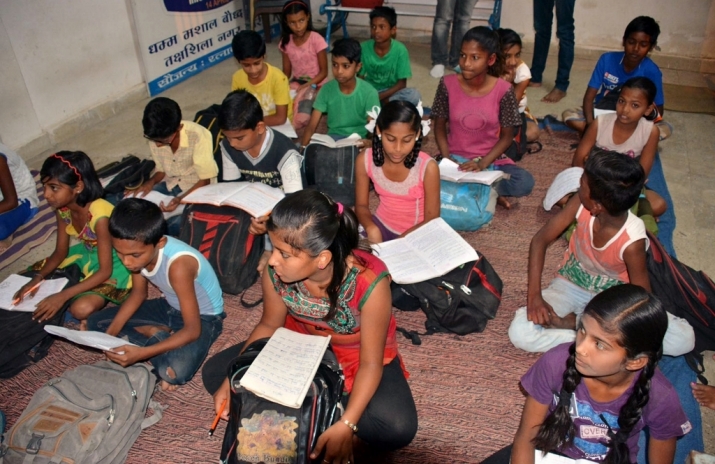 Free tuition classes give slum children a good start in life. Image courtesy of the Bodhicitta Foundation and Marc Leow.
Free tuition classes give slum children a good start in life. Image courtesy of the Bodhicitta Foundation and Marc Leow.For those living in the slum, education is the way to break out of the poverty trap. But children from the lowest caste often suffer from derogatory treatment in schools and are neglected by teachers. In addition, the general standard of public education is very low. To provide these disadvantaged children with a good start in life, the foundation runs three tuition centres for some 130 children. In addition, the foundation provides meals and additional nutrients for many of the children after class to support their growth and development. For many, this one nourishing meal and protein drink is something to look forward to every evening. More than 7,000 meals are cooked each year. With proper nutrition and tuition, these children stand a better chance of reaching their full potential and of fulfilling their dreams.
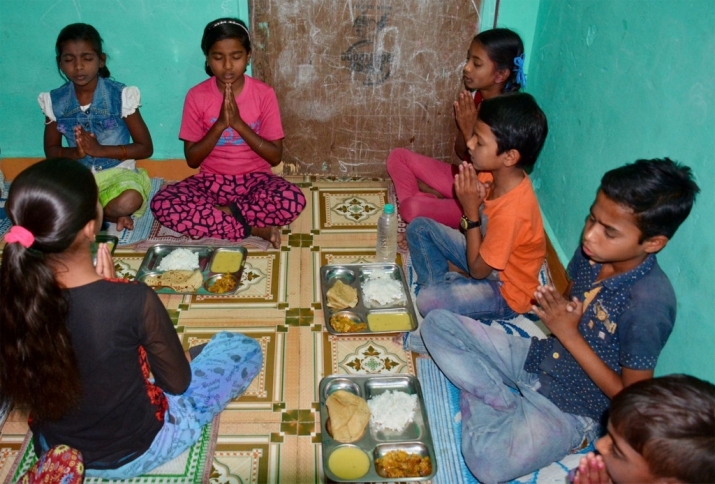 Giving thanks before tucking into a nutrituous meal. Image courtesy of the Bodhicitta Foundation and Marc Leow
Giving thanks before tucking into a nutrituous meal. Image courtesy of the Bodhicitta Foundation and Marc LeowAll across India, Dalit women suffer from a triple burden of gender bias, caste discrimination, and economic deprivation. They are often subjected to abuse and sexual violence, not only by the higher castes, but also within their own families. To empower these economically disadvantaged women, the foundation provides a range of courses such as English language, computer skills, sewing, tailoring, and beauty therapy, providing them with better chances of finding employment.
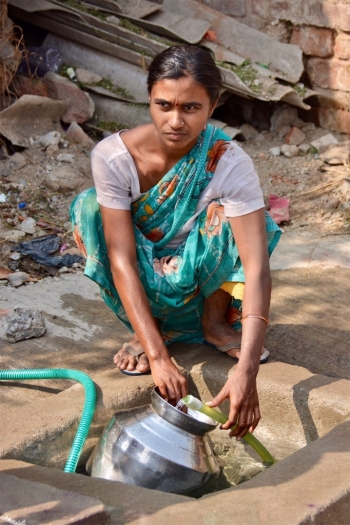 Dalit women often work hard but suffer more than most because of gender bias and caste discrimination. Image courtesy of the Bodhicitta Foundation and Marc Leow
Dalit women often work hard but suffer more than most because of gender bias and caste discrimination. Image courtesy of the Bodhicitta Foundation and Marc Leow“The women in the slums are very strong. Many of their husbands are drinking or injured, the women do all the work but get no respect,” said Shalini, the sewing teacher. “As these women learn new skills, their husbands have less of a financial burden and their children can be educated. In this way, the whole family and, in turn, society can improve.”
One such woman is Aisha, who is in her mid-40s. For as long as Aisha can remember, her life has been a constant battle, consumed by poverty and caring for her mentally deranged father. Her mother earns a measly income selling vegetables and doing various odd jobs from morning to night. At 18, Aisha was forced to marry a man 14 years her senior. Tormented by her husband and his family, she suffered a broken collar bone, a damaged spine and hip, broken arms, and lost her front teeth, but remained in the marriage for the sake of her three sons. When she met Ayya Yeshe, she started to learn not only about Buddhism and meditation, but also about women’s rights. “I felt I had found a supportive spiritual family,” she said. “It is really the first time people have asked me about my life and given me the right to speak. Although I am usually too tired to remember the Dharma teachings, I know the heart of the teachings is compassion and to be a good person. That is what I am trying to do with my life.”
Aisha entered the sewing course and is now making some extra money, having learned to be more independent. With Ayya and other women, she travelled out of Nagpur for the first time, saw Delhi, met the Dalai Lama, and visited the holy places of Buddhism: “I feel my mind is broader now, and that I have received many blessings from travelling.” With courage, dignity, and a purpose in life as she helps to uplift others in her community, Aisha says: “I feel old now, but I will keep fighting the good fight to the end, for myself, my kids, and my community. When politicians here say women are equal and have a good life, I feel like asking the men where their wives broke their collarbone or to show me a photo of a slum where the women do not have bruises. Maybe I will run for politics and fight for poor people. I can rest when I am dead!”
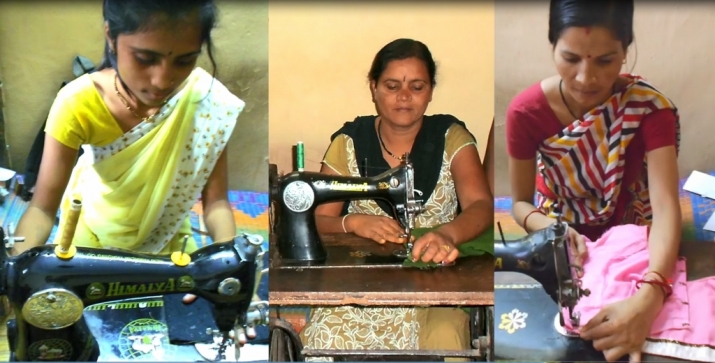 The sewing program empowers economically disadvantaged women to be self-reliant and independent. Image courtesy of the Bodhicitta Foundation and Marc Leow
The sewing program empowers economically disadvantaged women to be self-reliant and independent. Image courtesy of the Bodhicitta Foundation and Marc LeowTo allow young girls in the area to deepen their spiritual experience, temporary ordination is conducted over the school holidays. For these girls, being able to go on retreat, away from the cramped living quarters at home, brings peace of mind. They get to go on trips to holy places and parks, something their parents can ill afford. Ayya hopes that one day, she can build an ashram for these girls, rather than using rented properties. The ashram would be a haven where orphans and girls whose families cannot afford to support them could study to become nuns and be nurtured from a young age as the future generation of Dharma teachers and social workers. It would provide those who wish to live an independent life with an alterative to an arranged marriage.
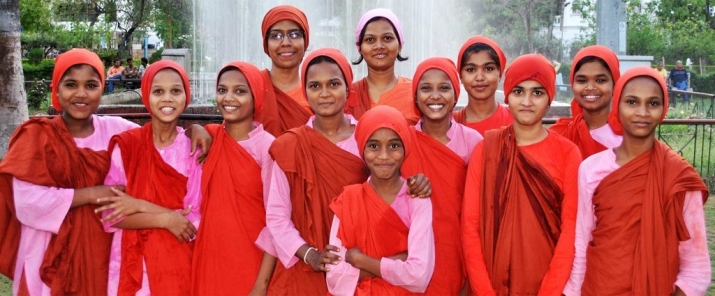 Temporary ordination not only deepens the girls' spiritual experience but is an eye-opener as the girls go on excursions. Image courtesy of the Bodhicitta Foundation and Marc Leow
Temporary ordination not only deepens the girls' spiritual experience but is an eye-opener as the girls go on excursions. Image courtesy of the Bodhicitta Foundation and Marc Leow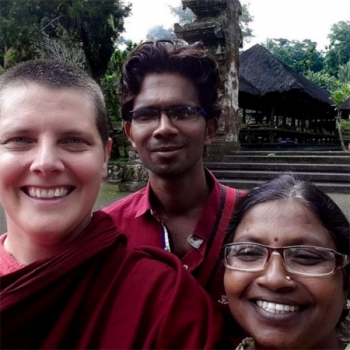 Ayya Yeshe with manager Mahendra and teacher Shalini.
Ayya Yeshe with manager Mahendra and teacher Shalini.It is not only women and children who have benefitted from Ayya Yeshe’s works, as Mahendra, the foundation’s manager, recounts, “When I first met Ayya more than 10 years ago, I had no direction. I could hardly manage a handful of words in English. Ayya encouraged me to study English and guided me along the way. With her support, I managed to get a degree in social work. I am really glad with this job as I am helping to empower poor people and make a difference. Thanks to the Bodhicitta Foundation, I have come a long way.” Today, Mahendra not only oversees the operations of the Bodhicitta Foundation but speaks fluent English and serves as translator for Ayya Yeshe’s teachings in India. Through Mahendra’s humility and gentleness, I could sense the strong affection and respect for Ayya Yeshe, which he shares with everyone whose life she has touched.
Musing about the future, Ayya Yeshe says: “I think about the legacy I will leave when I die (hopefully not for a while), and the many people who still struggle in desperate poverty. I have embraced those people and become part of their community. They are like my family. They laugh with me and cry on my shoulder. It is a strange life I have. Perhaps many think I am crazy to want to share my life with Indian slum people. I have found joy and learning, as well as sorrow and growth on this path. I do not know what the future will bring, but it is my wish to benefit as many beings as possible and grow spiritually.”
* Dalits are members of the lowest caste in the traditional Indian caste system.
See more
Bodhicitta Foundation
























